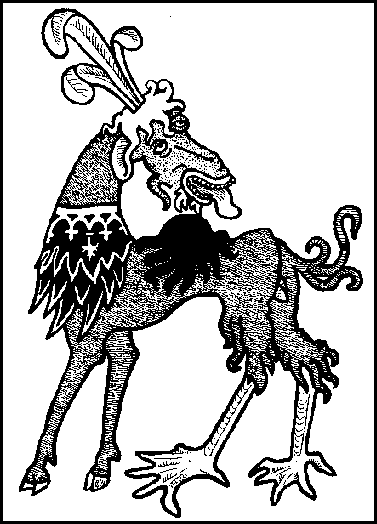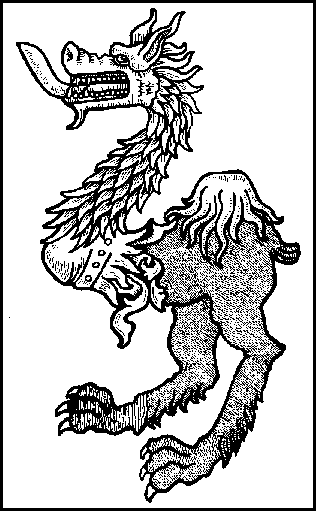On an Elephant
Helena Petrovna Blavatsky
This is how it happened: as we had to climb a steep mountain road, we decided to ride on elephants. The best two in town, a male and a female, were brought to us, their owner assuring us that "The Prince of Wales himself had ridden them and was quite satisfied." For the whole pleasure --- a round trip taking the entire day --- we were to pay two rupees for each elephant; so we shook hands as sign of a bargain and started to make ready. Our native friends, accustomed from infancy to balancing on elephants, immediately scrambled up on the back of one of them. They covered him like flies, casually settling down here and there, wherever they happened to alight; they held on by ropes, using their toes more than their fingers, and generally presented a picture of perfect contentment and comfort. We Europeans were given the female elephant, as being the tamer of the two; on her back were fastened two little benches with sloping seats on either side, without the slightest support for our backs. We looked with distrust upon this "perfected" seat, but had no choice. Our driver, the mahout, placed himself between the ears of the huge elephant, whose actual size can hardly be judged by the wretched half-grown animals shown in itinerant European circuses. After the mahout had ordered the elephant to kneel, we somehow or other climbed on its back with the aid of a small ladder and a shameful feeling of goose flesh. Our she-elephant answered to the poetical name of Chamchalâî-Peri (the "active fairy"), and really was the most obedient and the merriest representative of her tribe I have ever seen. Clinging firmly to each other, we at last gave the signal for departure, and the mahout, an iron javelin in hand, goaded the right ear of the animal. First the elephant raised itself on its fore legs, tilting us all backwards; then it heavily rose on its haunches, and we rolled forward, threatening to upset the mahout. But this was not the end of our trials! The very first steps of Peri slithered us off in all directions, like quivering fragments of jelly. We stopped. Somehow or other we were picked up, partly with the good-natured help of Peri's trunk, and the journey was resumed. The very thought of five miles of this before us filled us with horror, but we were ashamed to give up the excursion and indignantly refused to be tied to our seats, as was suggested by our laughing companions. However, I had occasion to repent bitterly this display of vanity. This unusual mode of locomotion was something incredibly fantastic and at the same time ridiculous. A horse carrying our luggage trotted by the side of the elephant which was moving with its measured gait and looked, from our unfamiliar elevation, no bigger than a donkey. Every step of Peri made acrobats of us, forcing us to perform most unexpected stunts. When she put her right foot forward, we dived forward; when it was her left foot, we fell back like so many sheaves of grain, all the while being tossed from one side to the other. This experience, especially under a scorching sun, soon became akin to a feverish delirium --- something between seasickness and a nightmare. To crown our pleasure, when we began to ascend a tortuous, stony little path along the rim of a deep ravine, our Peri stumbled. This sudden shock caused me to lose my balance altogether. I was sitting on the hind part of the elephant's back, in the place of honor, and began to roll down, unable to stop; no doubt, in a moment I would have found myself at the bottom of the ravine, with some unseemly damage to myself, had it not been for the astounding instinct and understanding of the clever animal. She put a halt to my fall from her "slope," literally catching me in flight on her tail. Probably having felt that I was falling, she skillfully twisted her tail around my body, stopped short, and began to kneel down. But my natural weight proved too much for the thin tail of this kind animal. While Peri did not drop me, she hurriedly laid me down and moaned plaintively, probably thinking she had nearly lost her tail as a result of her generosity. This was apparently the opinion of the mahout who jumped off her head, hurried to my rescue, and then proceeded to examine the allegedly "damaged" tail of his animal. We now witnessed a scene clearly characteristic of the low cunning, slyness, greediness and, at the same time, cowardice of a lower class Hindu, an outcastes, as they are called here.
At first, the mahout coldbloodedly examined the tail and, to make sure, pulled it several times; he was about to return to his usual place, but upon hearing me unguardedly express my commiseration with regard to Peri's tail, he suddenly and most unexpectedly changed his tactics. He threw himself flat on the ground and rolled about uttering horrible groans. Sobbing loudly, he started to mumble and lament as if over a corpse, trying to convince everybody that "Maam-Saab" had torn off his Peri's tail, that Peri was forever disgraced, and that her husband, the proud Airâvata, direct descendant of Indra's own favorite elephant, having witnessed her shame, would now renounce his spouse, who would have nothing left but to die.
Thus yelled the mahout, paying no attention to the remonstrances of our companions. In vain we tried to persuade him that the "proud Airâvata" did not show the slightest disposition to be so cruel to his spouse, the kindly Chamchalâî-Peri, against whose flank, even at this critical moment, he was quietly rubbing his trunk, and that Peri's tail was undamaged and in place. All this was of no avail! At long last, our friend Nârâyana, a man of unusual strength, lost his patience and had recourse to rather original means. With one hand he threw down a silver rupee, and with the other he seized the puny figure of the mahout by his dhôti, and, lifting him, hurled him after the coin, head first. Without giving a thought to his bleeding nose, the mahout jumped at the rupee with the greediness of a wild beast springing upon its prey. He prostrated himself in the dust before us repeatedly, with endless "salaams," in token of gratitude; and without the slightest transition, expressed an equally mad joy, where but a moment ago was abject sorrow. To terminate the spectacle, and to show that the tail was really whole, thanks to the "prayers of the saab," he hung himself on it, like the bell-ringer on the rope of his bell, till he was torn away from it and made to regain his seat. "Is it possible that a single miserable rupee can have been the cause of all this?" we asked each other in utter bewilderment.
Remember also the long centuries of oppression from his own Brâhmanas, from fanatical Moslems who regard a Hindu as no better than an unclean creature, and finally from our present, highly-educated, humanitarian rulers, the English, and maybe, instead of disgust, you will feel profound pity for this caricature of humanity." But the "caricature" of humanity evidently felt perfectly happy and not in the least conscious of any humiliation. Sitting cross-legged on the roomy forehead of Peri, he was telling her of his unexpected wealth, reminding her that she was a "divine" she-elephant, and ordering her to salute the saabs with her trunk. Peri, now in the best of spirits, after the gift of a whole stick of sugarcane from me, lifted her trunk backwards and playfully blew into our faces.
 "Your astonishment is natural enough," replied our Hindus. "It would be hard, especially for us, not to feel shame and disgust at the sight of such greediness and abasement. But do not forget that this wretched mahout, who most likely has a wife and children, nominally receives from his employer 12 rupees a year, and no board, while in reality he is more often paid by kicks than by money.
"Your astonishment is natural enough," replied our Hindus. "It would be hard, especially for us, not to feel shame and disgust at the sight of such greediness and abasement. But do not forget that this wretched mahout, who most likely has a wife and children, nominally receives from his employer 12 rupees a year, and no board, while in reality he is more often paid by kicks than by money.